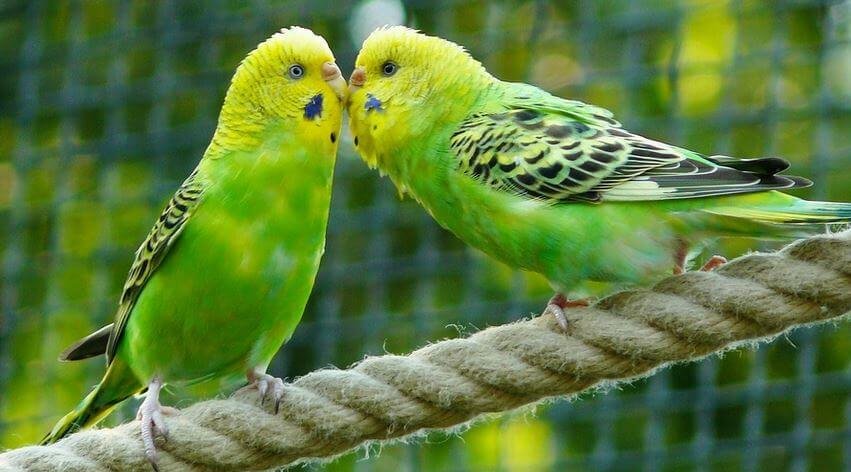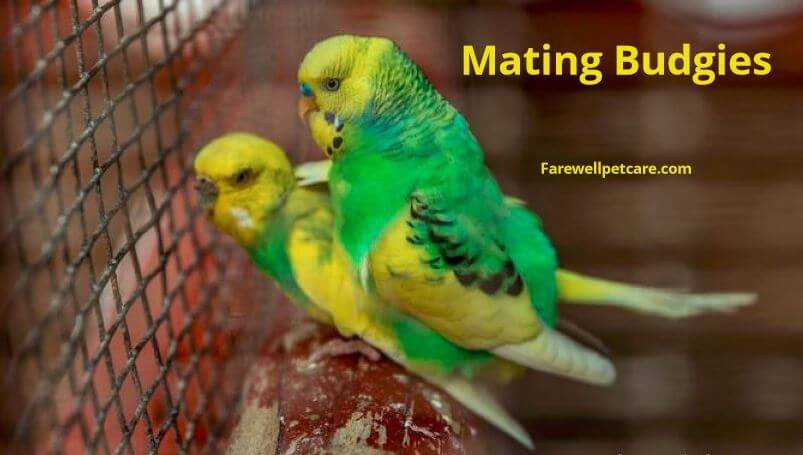During the breeding period, budgie behavior can be confusing. As such, one of the questions you may want answered as a new budgie owner is, “How many times do budgies mate before laying eggs?”
Budgies mate 3 to 4 times daily for about 10 days before laying eggs. However, the number of times they mate daily can be more, depending on budgie species. The budgies will continue mating until the female budgie completes her clutch of 4 to 7 eggs.
The number of mating depends on the birds’ health, closeness (are they in one cage and for how long), and maturity. And it varies from one budgie to another. Mating stops once the hen stops laying.
In this article, you’ll know the answer to the burning question, “How many times do budgies mate before laying eggs?” You’ll know the factors that affect the number of times budgies mate before laying eggs. Stay tuned!
How Many Times Do Budgies Mate Before Laying Eggs? Important Factors

While budgies can mate several times a day, the average number varies among different budgies. The reasons for variations are environment, health, age, and how close the pair is.
A rough idea of this number could help you determine infertility in your budgies. This is because if the male budgie only mates a few times, the chances of his sperm fertilizing the eggs could be significantly low.
Find Out: How Often Do Budgies Molt? Here Is What to Do
1. A Suitable Environment
The rate of mating draws something from an inviting environment. Yes, budgies can mate without a nest box. But more success is expected when a nesting box is provided.
It ensures more privacy for the two lovebirds while offering a safe environment for laying eggs. Budgies are happier hiding and doing their thing without eyes around them.
2. Closeness of Mates
You expect mating rounds to be fewer when budgies stay in different cages. While this has benefits, the greatest fear is the low probability of the eggs getting fertilized.
If you want to increase the rate of fertilized eggs, have your budgies stay in one cage. It increases the number of rounds your birds will mate. The more rounds, the higher the chances of success in laying fertile eggs.
3. Age of Your Budgie
Consider the age of your budgies. Full-grown budgies should successfully mate after a short time compared to older, almost infertile budgies.
Also, mating could be minimal if the age difference between the two mates is high. The best example is when the female budgie is way younger than the male. Usually, the male will not be interested in a young female.
The result is either a reduced number of mating or no mating. The same happens when the female is too old than the male.
4. The health of the Budgies
Both birds should be healthy and have a proper diet to enhance their performance during this crucial time. A good, well-balanced diet with all the required nutrients means active birds.
In nature, budgies start breeding when there’s plenty of food. They know they can have a great meal to maintain their reproductive health.
Also read: Do Budgies Lay Eggs Without Mating? The Truth Unveiled
How Long After Mating Do Budgies Lay Eggs?

After mating, it takes ten days for the female budgie to start laying eggs. The hen will lay an average of 4-7 eggs within two weeks.
Once the female starts feeling changes in her body, she prepares where she will lay the eggs. You should provide a nesting box at this point. By the time the first egg comes out, your budgie should be in a comfortable, safe, and private place.
As the budgie lays eggs, supplement her diet with a calcium block. Vegetables and leafy greens should not miss out on her menu as well.
Egg laying is a crucial stage of the budgie breeding cycle. She is potentially using plenty of calcium, and replenishing it is critical. Similarly, she must have a strong and active immune system against possible infections.
Budgies won’t lay eggs on consecutive days. Expect an egg after 2-3 days until they are done laying.
Some female budgies may continue laying more eggs beyond the expected two weeks. This condition is referred to as chronic egg-laying. It’s a life-threatening process.
According to Dr Laurie Hess, DVM, DABVP (VCA Animal Hospitals), “Chronic egg laying could cause malnutrition due to chronic calcium depletion from the body. This calcium goes to the production of eggshells.”
How Do Budgies Behave Before Laying Eggs?
A budgie ripe to start laying eggs may show signs of restlessness, molting its feathers and scratching the cage floor.
She tries to move from one corner of the cage to another to find a suitable spot for egg-laying. She doesn’t mind dropping the egg on a bare floor. Unlike other parrot family members, budgies do not use grasses or paper on the floor to line their nests.
If the hen doesn’t find a suitable spot within, she may extend her search scope beyond the cage. For example, she will readily fly around the house to look for that safe spot if accorded free flight.
You must have the nesting box installed in the cage at this stage. A nesting box offers the perfect opportunity, space, and time to hide and lay an egg without interruptions.
While in the nest box, she may arrange the provided furnishings. But it’s not just a budgie thing collecting material for nesting.
Usually, egg formation and development enlarges her abdomen and vent. This is when you may see the male budgie regurgitating food for the hen while she sits in the nest.
How Many Times Budgies Breed in a Year?

Budgies can breed 2-3 clutches a year. However, if you’re a responsible budgie owner, you should breed them only once a year.
They are prolific birds and can give you many babies. Nevertheless, their health and general welfare comes first, other than how many offspring they can bring forth.
In the wild, budgies will only breed when the conditions allow. Their perfect breeding season is during wet springtime and summer when the rains are more than enough. At this time, there is plenty of seed meal to feed on.
That said, you can provide a special breeding diet if you feel you need more budgies in one year. However, you’ll still be straining the bird in the long run.
The following are tips to consider to breed budgies responsibly:
- Do not breed budgies that are six months old. Although they’re reproductively mature, younger budgies end up being poor parents.
- Provide a varied and balanced diet. You really don’t need to overhaul the routine diet as a whole – simply improve it with calcium supplements. There should be enough vegetables and fruits.
- Personal space for each breeding budgie should be enough. Your budgie’s cage should have a minimum measurement of 60x40x40cm. Cages should be equipped with nesting boxes for laying eggs, incubation, and raising her chicks comfortably.
- Do you have the requisite skills and experience to handle budgies, their chicks, or a large flock of budgies? This is vital because you don’t want your hen to bring forth offspring that wouldn’t be cared for.
The short disclaimer is, don’t breed budgies if you’re not ready to provide high-quality parenting.
How Long Does It Take for Budgie Eggs to Hatch?
Budgie eggs take an average of 18 days to hatch. Not all eggs may hatch by the 18th day—some can take up to 23 days of incubation before hatching.
Your budgie sits on the eggs until the last hatchling comes out. Beyond day 23, expect no egg to hatch. Even the budgie herself knows when eggs have overstayed.
The process of incubation begins when she lays the third egg. She’ll start to cover the three eggs as she looks to complete her clutch in a few days. This explains why hatching may sometimes look staggered across five days, from 18-23 days.
During incubation, the female budgie’s main focus is to ensure the eggs are well-covered, warm, and secure.
A baby budgie might take hours to come out of the shell. Don’t be impatient if the process takes too long; that’s normal. Remember not to help the chick as you’re likely to cause injury to its soft tissues – except in emergencies.
The alternative method of hatching budgie eggs involves using an artificial incubator. If you don’t want to strain your bird, you can incubate the eggs yourself. They’ll still take between 18-23 days to hatch.
Provide ideal conditions in the incubator, such as a temperature between 99-102℉ (37.22-38.89℃). Eggs also need regular turning each day. Failure to replicate what the budgie offers will result in unhatched eggs at the end of the incubation period.
How Many Eggs Do Budgies Lay First Time?
As a whole, a budgie can lay 4-6 eggs for the first time. The subsequent clutches should still have the same number of eggs. However, some budgies can lay up to eight eggs, thanks to good environmental conditions and a healthy diet.
Everything can go south with the first budgie clutches. A typical scenario is where the first-time layer lays the first egg and stops there. Or, after laying the complete clutch, she loses interest in her eggs, thereby leaving them.
Sometimes, it can even throw them out of the nest. This should not be a serious concern for you. First-time mothers can be so naive and lack the caring aspect.
That’s why experts recommend waiting for your female budgie to attain one year before breeding them.
Feeding your hens a nutritious, healthy diet is the gold standard of good care and management. During breeding, don’t feed your bird with seed mix. Instead, a pelleted diet, complemented with leafy greens, chopped vegetables, and cooked eggs, is a perfect menu.
Watch out for chronic egg-laying and egg binding. These are dreadful conditions that a young mother may experience during egg laying. Visit your avian veterinarian to diagnose and treat your bird immediately.
Final Thoughts
Now that you know the answer to the question, “How many times do budgies mate before laying eggs?” go ahead and ensure your feathered friend has the right conditions and diet for mating and laying healthy eggs.
However, ensure your budgie hen is at least one year before breeding to prevent egg-binding complications.

